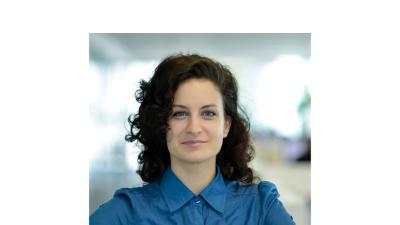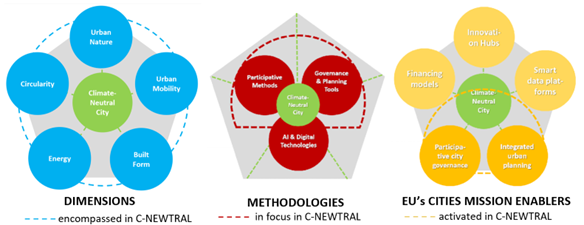
Blog post #1 (December 2024)
The C-NEWTRAL STORY
Dr. Aura-Luciana Istrate is Assistant Professor in Sustainable Urbanism and Urban Planning at University College Dublin. She is the Primary Coordinator of C-NEWTRAL Doctoral Network and co-leading the Horizon Europe project REALLOCATE. She is leading the Active Research Group at UCD with research interests concerning active mobility and public spaces, integrating nature-based solutions in cities, community engagement, and overall improving urban liveability and vitality.
C-NEWTRAL project aims to rethink the path to climate neutrality through interdisciplinary doctoral research on citizen engagement and city governance decision-making for integrated planning.
Being aware of how competitive the Marie Skłodowska-Curie Actions (MSCA) funding stream is, the awarding of C-NEWTRAL project came as an immense surprise. Long hours of work, ideation, and reiteration have been put into it, but from my perspective, the key stood in the dedication and belief that this project can make a difference in doctoral training. As a young female coordinator, the process of writing the project has significantly pushed me beyond boundaries in terms of concentration, determination, and grit. Having the project awarded is proof of possibility for any researcher who dares to face these challenges. The way C-NEWTRAL was framed and how it is expected to advance the frontiers of knowledge is explained below.
The European Union (EU) aims to make Europe the first climate-neutral continent, and while this is often described as a moonshot, the current climate and societal challenges do not leave us much time for transformation. One major challenge is that while cities are the greatest emitters of greenhouse gases, as well as the greatest consumers of energy, nearly 85% of Europeans are expected to live in cities by 2050 ((opens in a new window)Nicolaides, 2021).
The European Commission has hence promoted a ‘Climate-Neutral and Smart Cities’ Mission as a strategy towards climate neutrality. The Mission has designated 100+12 cities to become climate-neutral by 2030, meant to act as experimentation hubs, promoting innovation and inspiring transformation ((opens in a new window)European Commission, 2020a). Nonetheless, cities need comprehensive support in pursuing climate neutrality goals, as they face challenges related to fragmented action, ineffective investment, and lack of explicit implementation plans or governance models ((opens in a new window)Istrate et al., 2023). In order to reach climate neutrality, the actions cannot be driven by a single discipline or individualist point of view: climate city action requires multiscale and multidisciplinary research and decision-making. However, we can see a disconnect between research in sciences (social, ecological, or technological), and the urban planning policy and practice. Synergising a close environmental consideration with socially engaged citizens to transform innovation into action within a more responsive governance model is necessary ((opens in a new window)European Commission, 2020a).
In C-NEWTRAL, we gathered an interdisciplinary team of scholars (within fields of urban and spatial planning, political science, geography and geosciences, environmental sciences, and architecture technology) to address such challenges. Through structured discussions, we formulated a novel research approach for climate-neutral cities.
Derived initially from the literature conducted in autumn 2022, we identified five key dimensions of climate-neutral cities (urban nature; urban mobility; built form; energy; and circularity). Methodologically, we intersected these five dimensions with the research pillars of citizen engagement and city governance decision-making, while additionally considering digital technologies. The participatory pillar is meant to improve social outcomes and decisions through collaborating with citizens. Local participatory planning needs to happen continuously and meaningfully, while citizen engagement must be influential and inclusive. However, an advanced degree of participation is still difficult to reach and is often unequal across communities. The second pillar of city governance includes strategic long-term planning, as innovative reforms of local government systems to drive environmental justice are required. Translating climate neutrality in local policy documents is key, however issues of transparency and inconsistent political agendas are encountered. C-NEWTRAL proposes to address these issues both conventionally and through digital technologies. Despite significant technological achievements, involving stakeholders and citizens in the uptake of solutions has so far been limited. On the other hand, accounting for in-built biases in simulations and applications that technologies bring in prospective city governance, or the uneven involvement of communities in public participation is necessary to conclude on assumptions.
Within our interdisciplinary scholarly team, we conducted discussions to identify challenges and research gaps on the key dimensions of climate-neutral cities, and thereafter formulated relevant research topics as per the different fields of expertise of those involved. This has led to the formulation of a preliminary framework for integrated planning of climate-neutral cities (see Figure below), which has been refined and reiterated by the coordinator.

Figure 1: Dimensions, Methodology and Enablers activated in C-NEWTRAL
The research topics were outlined for further development and framing under individual PhD research projects of the Doctoral Candidates. Addressed through either a Citizen Participation, or City-Governance Decision-Making focus, enabled or not by new digital technologies, the topics are often found in-between the thematic/sectoral dimensions, concerning, for instance:
- Urban Nature & Circularity, such as connecting green spaces to enable biodiversity and consider urban water cycles, and incorporating nature-based solutions (NbS) to elicit ecosystem services;
- Buildings & Energy Infrastructure, such as looking at supplying affordable and sustainable high-quality housing, and striking the balance between high-energy performance buildings and affordability;
- Urban Mobility & Urban Nature, such as addressing active and green travel and mitigating car dependency while considering urban nature;
The research conducted in C-NEWTRAL will directly inform two enablers of climate-neutral cities as defined by the European Commission ((opens in a new window)2020a); these are specifically ‘participative city governance’ and ‘integrated urban planning’. It will also contribute towards digital transformation, which is another EC priority ((opens in a new window)2020b), although still underdeveloped in the city planning sector.
The European universities involved are the University College Dublin (Ireland), University of Bologna (Italy), University of Girona (Spain), University of Heidelberg (Germany), University of Helsinki (Finland), and Queen’s University Belfast (United Kingdom). The network includes scholars serving as academic supervisors to doctoral candidates’ (DCs) hosted at these six universities. In addition, the C-NEWTRAL operational network involves associated partners from industry and practice, government and public administration, as well as nonprofit/ citizen representatives such as NGOs and social agencies meant to provide training and non-academic secondments to the Doctoral Candidates. In total, partners from 11 EU member states and 2 Associated Countries (UK, CH) have come together to push the frontiers for integrated planning of Climate-Neutral Cities.
C-NEWTRAL provides a dynamic and intellectually challenging, interdisciplinary research environment. It has attracted the best 12 graduate candidates internationally (including non-EU researchers) and it aims to foster an international community of scholars in partnership with multiple sectors. C-NEWTRAL aims to contribute to training a new generation of innovative and interdisciplinary climate-neutral city researchers, able to detect and bridge gaps between participation and city governance while managing complex challenges.
The training developed in C-NEWTRAL will prepare the doctoral candidates to weave integrated, intensive, and rigorous research. Online training modules, problem-based, and methodological workshops are specifically designed for the intensive training of doctoral candidates. Specialist training related to citizen engagement and city governance decision-making for integrated planning in climate-neutral cities is at the core. In addition, training on transferable skills is also undergoing (e.g. related to ethics, gender equality in urban planning and climate research, as well as time management, and communication and dissemination activities). Furthermore, several self-management and self-leading activities are envisioned to increase the capacity and well-being of PhD students throughout their doctoral journey.
The long-term goal of C-NEWTRAL network is to ripple a wider synergetic framework within or beyond Europe that replicates some of the solutions developed/assessed to make the climate-neutral vision come true. The current C-NEWTRAL project will further act as a stimulus for pursuing cross-institutional training collaborations.
C-NEWTRAL is a Doctoral Network funded by the European Commission’s flagship program MSCA (Marie Skłodowska-Curie Actions), sitting under the Pillar I for ‘Excellent Science’ of Horizon Europe funding stream. The project has started in February 2024 and will continue until January 2028.
__________________________________________________________________________
This blog post is based on the C-NEWTRAL description of the action, funded by the European Commission (Grant Agreement 101119603, Coord: Aura Istrate). It also incorporates elements that have been published by (opens in a new window)Istrate, Popartan, Auerbach, Gaspari, and Tavangar (2023), in a perspective paper titled “Collaborative research for transitioning to Climate-Neutral Cities – contouring a prospective framework for integrated planning”, published in Planning Theory journal.